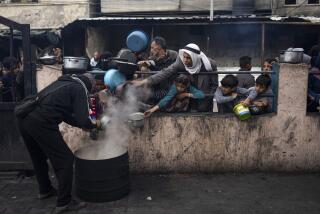Ethiopian Jews’ Rescue Halted : Airline Pulls Out; Israel Hopes to Renew Effort
- Share via
JERUSALEM — Israeli officials said Sunday that they still hope to rescue more Ethiopian Jews despite publicity that they blamed for at least a temporary halt to an emergency airlift code-named “Operation Moses.”
A Belgian charter airline that had been ferrying the Ethiopian Jews, known as Falashas, from Sudan to Israel via three West European cities announced Saturday that the clandestine operation, under way since early November, “has ended as far as we are concerned.”
Top officials of the Jewish Agency, a quasi-governmental body that deals with immigration matters, confirmed that a flight scheduled for Sunday had been canceled. The last planeload of Falashas arrived at Ben-Gurion Airport near Tel Aviv on Saturday night.
A spokesman for the Belgian airline, Trans European Airways, was quoted by the British Broadcasting Corp. as saying widespread publicity about the sensitive rescue effort had made it impossible to continue.
The Jerusalem Post reported Sunday that the airline does considerable business flying Muslim pilgrims to Mecca, which might account for its sensitivity.
The black Jews, who claim to be descended from one of the lost tribes of Israel, have been fleeing famine-plagued Ethiopia along with thousands of their countrymen and arriving on foot at refugee camps in Sudan.
Most details of the rescue operation are still secret. However, a Belgian government spokesman said the airline had flown 7,000 Falashas to Israel in 35 flights since November, according to the Associated Press. Almost 6,000 others had reportedly managed to reach Israel earlier.
An estimated 12,000 Ethiopian Jews remain in the Horn of Africa, and Israeli officials said earlier that Operation Moses had been expected to last a few more weeks in order to rescue them.
As many as 4,000 of the remaining Ethiopian Jews were already “in the pipeline” when the Belgian firm made its announcement, and well-informed sources said efforts are now expected to concentrate on getting them the rest of the way to Israel.
Cabinet Discusses Issue
The Israeli Cabinet discussed the situation at its regular meeting Sunday but did so in the framework of the Ministerial Defense Committee, meaning that its deliberations were secret.
A Cabinet source told reporters later that “the hope was that the rescue operation had not come to its end.” The source added that “there was absolutely no truth to reports that there had been Israeli-Sudanese cooperation in the operation.”
For weeks, the Israeli press kept a voluntary lid on the story for fear that premature disclosure could endanger those Ethiopian Jews still struggling to escape. But details began to leak in the United States last month after fund-raising appeals to support the airlift.
Last week, a Jewish Agency official revealed more details in an interview with an obscure Israeli publication. The major news agencies picked up the story, and the disclosures snowballed.
Last Thursday, Israeli officials called a hurried press conference at which they provided some information in hopes of satisfying the media without jeopardizing the program. However, the next day, Marxist-governed Ethiopia condemned the secret airlift as “a gross interference” in its internal affairs.
On Sunday, Iran accused Sudan of “treachery” for allegedly cooperating with the airlift, a charge that Sudan denied. And Libya demanded an Arab League debate on the issue.
Two opposition Israeli political parties said Sunday that they will put no-confidence motions before the Knesset, the Israeli Parliament, as a result of what they termed government blundering in holding Thursday’s press conference.
Recently arrived Ethiopian Jews were angry and distraught Sunday, fearing that an end to the rescue operation will leave friends and relatives stranded in Africa.
A press tour of an “absorption center” for new immigrants in the Mediterranean coastal town of Ashkelon was cut short when the angry Falashas refused to talk with journalists, whom they apparently blame for the cancellation of the airlift and for jeopardizing the rescue of their relatives.
In Jerusalem, a group of about 30 Ethiopian Jews came to the Western Wall to offer prayers for the safety of family members still in Ethiopia.
More to Read
Sign up for Essential California
The most important California stories and recommendations in your inbox every morning.
You may occasionally receive promotional content from the Los Angeles Times.













